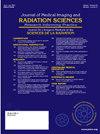VR training for pediatric MRI for exam anxiety: A meta-analysis
IF 2
Q3 RADIOLOGY, NUCLEAR MEDICINE & MEDICAL IMAGING
Journal of Medical Imaging and Radiation Sciences
Pub Date : 2025-09-30
DOI:10.1016/j.jmir.2025.102113
引用次数: 0
Abstract
Background
MRI exams can provoke significant anxiety due to the procedure’s length, noise, and potential for claustrophobia. This meta-analysis examines whether virtual reality (VR) mock MRIs can effectively reduce pre-exam anxiety in patients, offering a more accessible alternative to traditional mock scanners.
Methods
We followed PRISMA 2020 guidelines to conduct a meta-analysis of randomized controlled trials evaluating the effect of VR mock MRIs on anxiety levels in patients scheduled for MRI exams. After screening literature from PubMed, EMBASE, and ScienceDirect, six studies were identified, of which four focused on pediatric populations. Data extraction, quality assessment (Jadad and Delphi scales), and statistical analysis were conducted. The data was normalized and a random-effects model used to assess anxiety reduction using Hedges' g.
Results
The meta-analysis revealed that VR mock MRIs did not significantly reduce anxiety before the MRI (p = 0.08), but approached significance for pre-VR and post-MRI anxiety in the intervention group (p = 0.06). Furthermore, no significant differences were observed in anxiety levels post-MRI or when compared with control groups. High heterogeneity was present, likely due to variations in study methodologies, VR interventions, and participant characteristics.
Discussion
VR mock MRI was shown to not significantly reduce pre-exam anxiety. However, though there were promising results for pre-VR to post-MRI anxiety, the high heterogeneity and limited studies indicates the need for further research. However, the results may be affected by the meta-analysis being underpowered due to the lack of studies.
Conclusion
This meta-analysis did not show any effect of VR mock MRIs to reduce pre-exam anxiety in patients. More studies necessary to fully evaluate the question and provide more data for further analysis.
儿童MRI虚拟现实训练治疗考试焦虑:荟萃分析。
背景:核磁共振检查可引起显著的焦虑,由于程序的长度,噪音和潜在的幽闭恐惧症。本荟萃分析探讨了虚拟现实(VR)模拟核磁共振成像是否能有效减少患者的考试前焦虑,为传统模拟扫描仪提供更容易获得的替代方案。方法:我们遵循PRISMA 2020指南,对随机对照试验进行荟萃分析,评估VR模拟MRI对计划进行MRI检查的患者焦虑水平的影响。在PubMed、EMBASE和ScienceDirect的文献筛选后,确定了6项研究,其中4项集中在儿科人群。进行数据提取、质量评价(Jadad和Delphi量表)和统计分析。结果:荟萃分析显示,VR模拟MRI并没有显著减少MRI前的焦虑(p = 0.08),但在干预组中,VR前和MRI后的焦虑接近显著(p = 0.06)。此外,与对照组相比,mri后的焦虑水平没有显著差异。存在高度异质性,可能是由于研究方法、虚拟现实干预和参与者特征的差异。讨论:虚拟现实模拟MRI显示不能显著减少考前焦虑。然而,尽管vr前到mri后的焦虑有很好的结果,但高异质性和有限的研究表明需要进一步的研究。然而,由于缺乏研究,meta分析的能力可能会受到影响。结论:本荟萃分析未显示VR模拟mri对减少患者的考试前焦虑有任何作用。需要更多的研究来充分评估这个问题,并为进一步分析提供更多的数据。
本文章由计算机程序翻译,如有差异,请以英文原文为准。
求助全文
约1分钟内获得全文
求助全文
来源期刊

Journal of Medical Imaging and Radiation Sciences
RADIOLOGY, NUCLEAR MEDICINE & MEDICAL IMAGING-
CiteScore
2.30
自引率
11.10%
发文量
231
审稿时长
53 days
期刊介绍:
Journal of Medical Imaging and Radiation Sciences is the official peer-reviewed journal of the Canadian Association of Medical Radiation Technologists. This journal is published four times a year and is circulated to approximately 11,000 medical radiation technologists, libraries and radiology departments throughout Canada, the United States and overseas. The Journal publishes articles on recent research, new technology and techniques, professional practices, technologists viewpoints as well as relevant book reviews.
 求助内容:
求助内容: 应助结果提醒方式:
应助结果提醒方式:


